
Acacia murrayana is a tree in the family Fabaceae. It has numerous common names, including sandplain wattle, Murray's wattle, fire wattle, colony wattle and powder bark wattle that is endemic to arid areas in every mainland State except Victoria.

Acacia deanei is a tree native to Australia, which is useful for controlling soil erosion. There are two subspecies: Acacia deanei subsp. deanei and Acacia deanei subsp. paucijuga.

Acacia effusifolia is a shrub or tree belonging to the genus Acacia and the subgenus Juliflorae. It is native to an area in the Mid West and the Wheatbelt regions of Western Australia.

Acacia fauntleroyi is a shrub or small tree belonging to the genus Acacia and the subgenus Juliflorae that is endemic to a part of south western Australia.

Acacia hamersleyensis, also known as Karijini wattle or Hamersley Range wattle, is a tree or shrub belonging to the genus Acacia and the subgenus Juliflorae. It is endemic to a small area in central Western Australia.

Acacia jibberdingensis, also known as Jibberding wattle or willow-leafed wattle, is a shrub or tree belonging to the genus Acacia and the subgenus Juliflorae that is endemic to Western Australia.
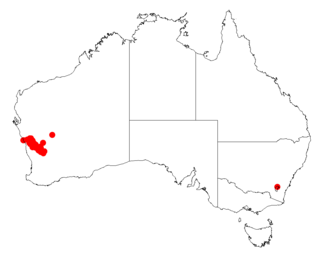
Acacia longiphyllodinea, commonly known as yalgoo or long-leaved wattle, is a shrub belonging to the genus Acacia and the subgenus Juliflorae that is endemic to parts of western Australia
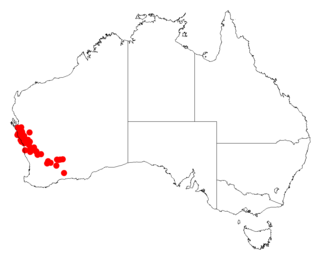
Acacia signata is a tree or shrub belonging to the genus Acacia and the subgenus Juliflorae that is endemic to western Australia.

Acacia trachycarpa, commonly known as minni ritchi, curly-bark tree, sweet-scented minni ritchi or Pilbara minni ritchi, is a shrub or tree belonging to the genus Acacia and the subgenus Juliflorae that is native to arid and semi-arid areas of Western Australia.

Acacia daphnifolia, also known as northern manna gum, is a tree or shrub belonging to the genus Acacia and the subgenus Phyllodineae that is endemic to Western Australia.
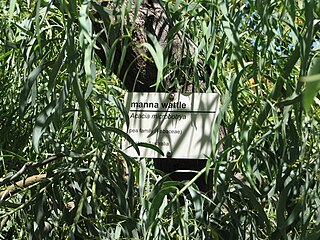
Acacia microbotrya, commonly known as manna wattle or gum wattle, is a shrub or tree belonging to the genus Acacia and the subgenus Phyllodineae that is native to Western Australia.

Acacia eremaea is a shrub or tree of the genus Acacia and the subgenus Plurinerves that is endemic to an area in western Australia.

Acacia recurvata, commonly known as the recurved wattle, is a shrub of the genus Acacia and the subgenus Plurinerves that is endemic to a small area of western Australia.

Acacia trineura, known colloquially as three-nerve wattle or three nerved wattle or green wattle, is a species of Acacia native to south eastern Australia.

Acacia debilis, commonly known as the spindly wattle, is a species of Acacia native to eastern Australia.

Acacia cretacea, also known as chalky wattle, is a shrub belonging to the genus Acacia and the subgenus Phyllodineae that is endemic to South Australia.

Acacia falciformis, also commonly known as broad-leaved hickory, hickory wattle, mountain hickory, large-leaf wattle, tanning wattle and black wattle, is a shrub belonging to the genus Acacia and the subgenus Phyllodineae that is endemic to eastern Australia
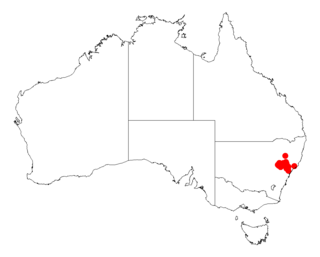
Acacia piligera, also known as grub-pod wattle, is a tree or shrub belonging to the genus Acacia and the subgenus Phyllodineae native to eastern Australia.
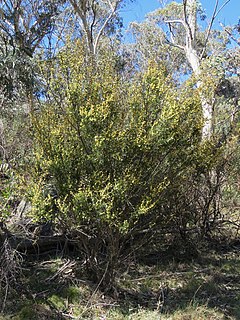
Acacia siculiformis, commonly known as dagger wattle, is a shrub belonging to the genus Acacia and the subgenus Phyllodineae native to south eastern Australia.

Acacia simmonsiana, commonly known as Simmons wattle or desert manna wattle, is a shrub belonging to the genus Acacia and the subgenus Phyllodineae native to south eastern Australia.





















